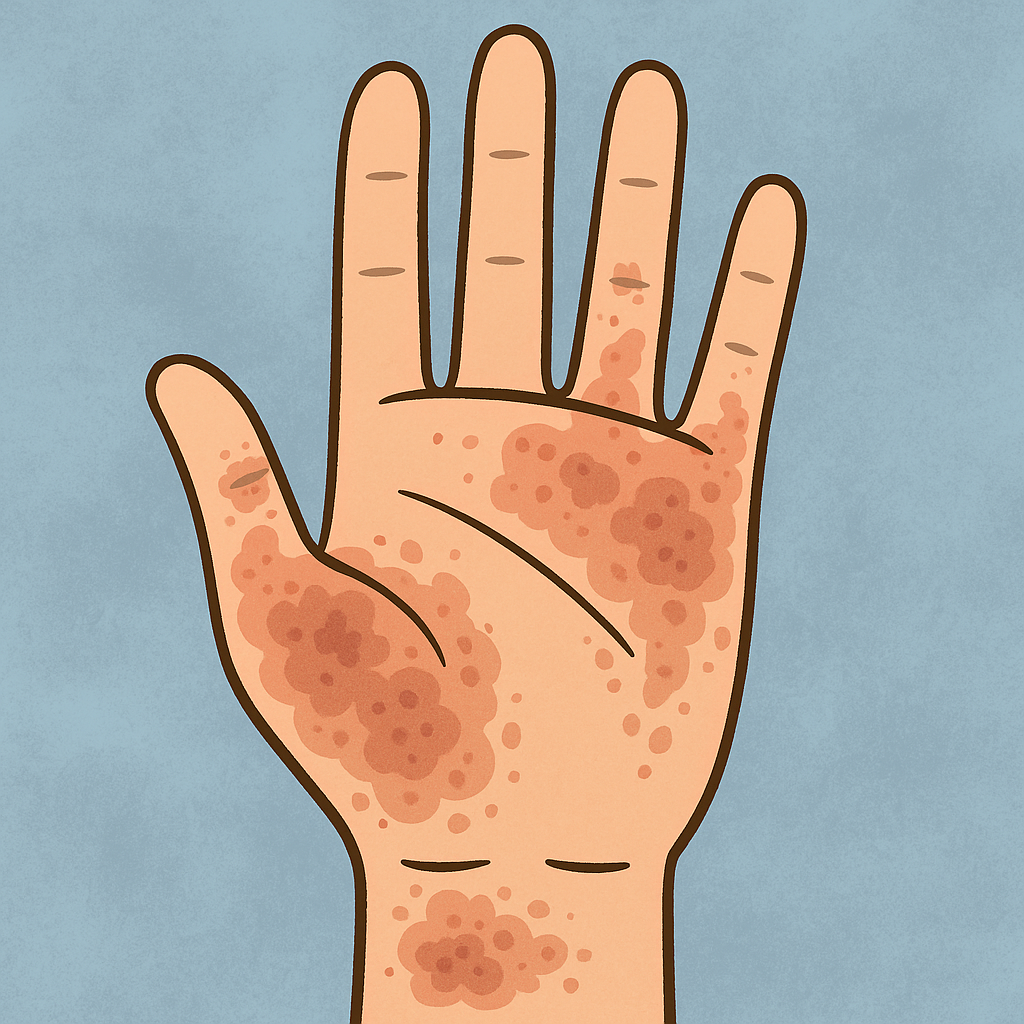Hand Eczema Solutions


have already shared their stories
Hand eczema, also known as hand dermatitis, is a common and often distressing condition that affects many individuals. This blog post will provide a comprehensive guide to understanding hand eczema, identifying eczema symptoms on hands, and exploring effective treatments, including how stress-related hand eczema can be managed.
Understanding Eczema on Hands
Hand eczema is a form of eczema that specifically affects the skin on the hands. It can cause significant discomfort and interfere with daily activities. Eczema on hands can be triggered by various factors, including irritants, allergens, and or stress. It often presents as dry, itchy, and inflamed skin.
.webp)
Eczema Symptoms on Hands
Recognizing the symptoms of hand eczema is crucial for early intervention and effective treatment. Common symptoms include:
Redness and Inflammation
The skin on the hands may become red and swollen. Inflammation is a hallmark of eczema and can cause significant discomfort.
Itching
Persistent itching is a common symptom of hand eczema. The itch can be intense, leading to scratching, which can worsen the condition.
Dryness and Cracking
Eczema often causes the skin to become extremely dry. This dryness can lead to cracking, which can be painful and increase the risk of infection.
Blisters and Oozing
In some cases, hand eczema can cause small blisters that may ooze fluid. These blisters can be painful and may form crusts as they heal.
Thickened Skin
Chronic hand eczema can cause the skin to thicken and become scaly. This is a result of prolonged inflammation and scratching.

Stress-Related Hand Eczema
The Role of Stress in Eczema
Stress is a significant factor that can trigger and or exacerbate hand eczema. When stressed, the body releases stress hormones like cortisol, which can affect the immune system and lead to increased inflammation. This can worsen eczema symptoms and make it harder to manage.
Managing Stress to Control Eczema
Managing stress is an important aspect of controlling hand eczema. Techniques such as mindfulness, meditation, regular exercise, and adequate sleep can help reduce stress levels. It is also helpful to identify and address specific stressors in your life.
Treatments for Hand Eczema
Effective treatment of hand eczema involves a combination of skincare, medications, and lifestyle adjustments. Here are some key treatments:
Moisturizers
Regularly moisturizing your hands is crucial for managing hand eczema. Look for creams and ointments that are fragrance-free and designed for sensitive skin. Ingredients like glycerin, ceramides, and shea butter are excellent for restoring moisture and protecting the skin barrier.
Topical Steroids
Topical corticosteroids are commonly prescribed to reduce inflammation and itching. They are effective in managing flare-ups but should be used as directed by a healthcare provider to avoid potential side effects.
Topical Calcineurin Inhibitors
These non-steroidal creams, such as tacrolimus and pimecrolimus, can be used to reduce inflammation and immune response. They are particularly useful for sensitive areas and long-term management.
Phototherapy
Phototherapy, or light therapy, involves exposing the skin to controlled amounts of natural or artificial light. This treatment can help reduce inflammation and improve symptoms for some individuals with hand eczema.
Avoiding Irritants
Identifying and avoiding triggers is essential for managing hand eczema. Common irritants include harsh soaps, detergents, and chemicals. Wearing gloves when cleaning or using irritant substances can help protect your hands.
Stress Management Techniques
As stress can exacerbate hand eczema, incorporating stress management techniques into your daily routine is beneficial. Practices such as yoga, deep breathing exercises, and regular physical activity can help keep stress levels in check.
Conclusion
Hand eczema can be a challenging condition, but understanding its causes, symptoms, and treatments can significantly improve your ability to manage it effectively. Recognizing eczema symptoms on hands early and addressing them with appropriate treatments is crucial for preventing severe flare-ups. Managing stress-related hand eczema is also an important aspect of treatment, as stress can worsen symptoms. By following a comprehensive treatment plan that includes moisturizers, topical medications, phototherapy, and lifestyle adjustments, individuals with hand eczema can achieve better skin health and improved quality of life.

have already shared their stories
- Guidelines for the Diagnosis, Treatment, and Prevention of Hand Eczema
Silvestre, S.J.F., Heras, M.F., Hervella, G.M., Palacios-Martínez, D., Sánchez, C.R., Senan, S.R., Apellaniz, A.G., Giménez-Arnau, A.M. (2020). Journal of Dermatology.
Link to article - New Perspectives in the Management of Chronic Hand Eczema: Lessons from Pathogenesis
Tancredi, V., Buononato, D., Caccavale, S., Di Brizzi, E.V., Di Caprio, R., Argenziano, G., Balato, A. (2024). International Journal of Molecular Sciences, 25(1), 362.
Link to article - Hand Eczema
Agarwal, U.S., Besarwal, R.K., Gupta, R., Agarwal, P., Napalia, S. (2014). Journal of Clinical and Experimental Dermatology Research.
Link to article - Hand Eczema: An Update
Lakshmi, C., Srinivas, C.R. (2012). Indian Journal of Dermatology, Venereology and Leprology, 78(5), 569-582.
Link to article - Hand eczema: epidemiology, prognosis and prevention
Agner, T., Elsner, P. (2019). Journal of Dermatological Treatment.
Link to article





.jpeg)




